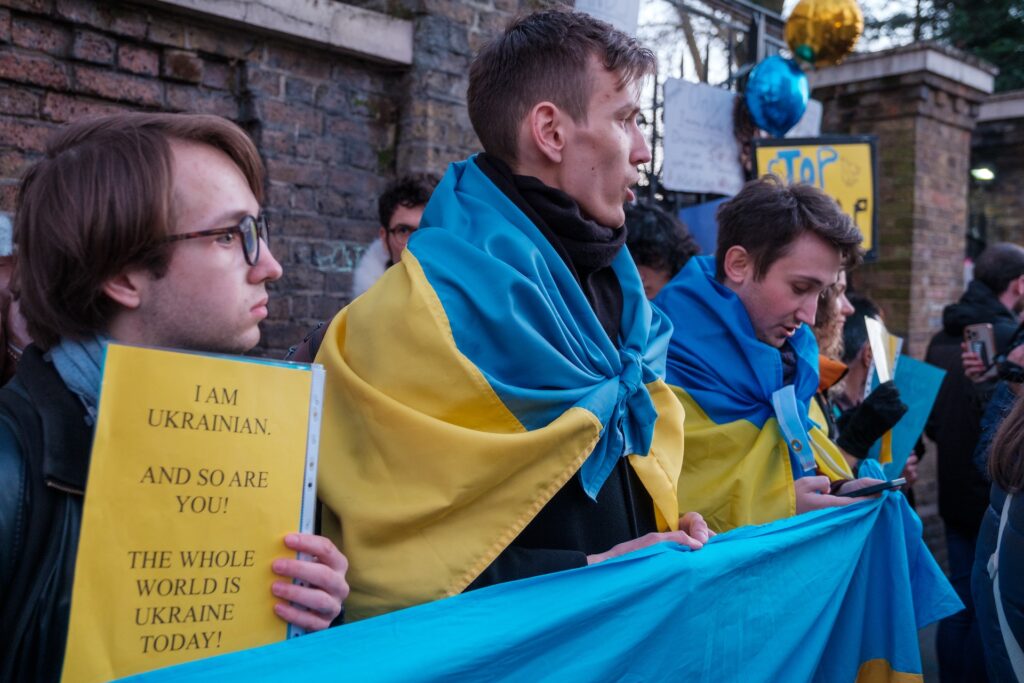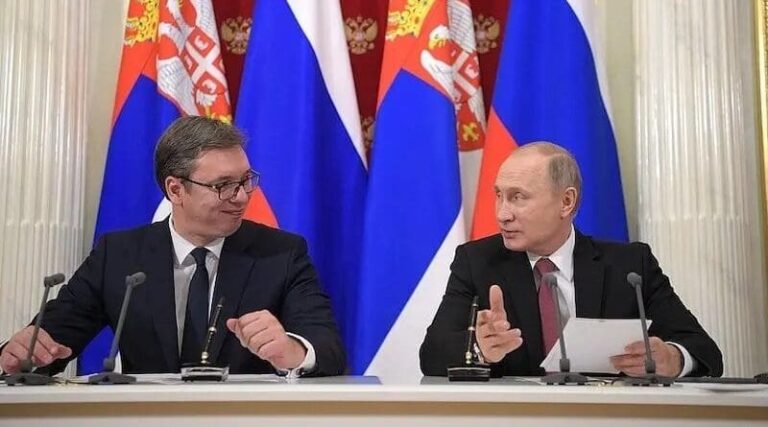Diplomacy[1] failed to prevent Russia from invading Ukraine, leaving tens of millions at grave risk of losing their lives, independence, and freedom. The tragedy of war is upon Ukrainians, with its effects being felt around the world. Many are asking what Putin’s geopolitical goals are and what the end of the crisis will be. These are important questions. But another concept has played a central role in causing the conflict and contributing to the rise in autocracies around the world—the promotion of personal and national identity based upon an historic or mythological past. This approach to identity increasingly is causing people and their leaders to miscalculate what is in their personal and national self-interest. The war in Ukraine serves as a particularly powerful example of what happens when they do.
The world faces innumerable challenges that have nothing to do with past mythologies and historic borders. Many of these challenges appear in the daily news, including climate change, human migration, and the risk of global pandemics. But there are many others, such as diminishing natural resources, the availability of clean water, air pollution, mass extinction, the collapse of ecosystems, ocean acidification, and the reduced nutritional value of food. Russia is not immune from these and other challenges, which will require a collaborative response in order for the global community to manage them successfully. Yet instead of fostering the alliances needed to address these critical issues, Putin increasingly has isolated Russia. Russia under his leadership is becoming politically and economically autarkic.
Russia has many of its own borderless challenges. Climate change will have particularly dire impacts on its future. According to a CSIS report, “Russia is warming 2.5 times faster than the rest of the world.”[2] By 2050, increases in temperature in the central regions of the country are projected to be between 2.6 and 3.4 degrees centigrade,[3] and its huge Arctic region is warming at twice the global average.[4] As a result, wildfires; heat waves; the collapse of infrastructure, including oil and gas pipelines; decreased precipitation; and floods will devastate many regions in the country and lead to human migration of Russians with largely non-transferrable skills. But Russia’s problems do not stop there. Grain production is projected to decrease 17 percent by 2050, with price increases well before that date. One pre-Ukrainian invasion estimate predicted that by 2030 the price of wheat will increase 29 percent; rice, 33 percent; and maize, 47 percent.[5]
These and other effects of climate change will impact a Russian population that already has one of the lowest life expectancies in the world—Russian men born today are expected to live, on average, under 68 years, which is below the life expectancy for North Korean men.[6] Russia’s population also is contracting. It peaked in 2020 and is projected to fall from 146 million to 136 million by 2050 and 126 million by 2100.[7] The current flight of Russians following the Ukrainian invasion will worsen these demographic realities. Moreover, the Russian economy is undiversified; oil and gas production constitute 39 percent of its federal budget revenue and 60 percent of its exports.[8] As a consequence of these and other factors, Russia is poorly positioned to manage its future challenges and participate in the world to come.
Said simply, Russia has immense challenges. But instead of fashioning the global relationships and alliances the country and its people will need to overcome them, Putin is harkening back to a Russian identity embedded in mythologies of the past, which, to the extent they ever were true, no longer have any meaningful role to play in protecting the Russian people. He has utilized these mythologies to sustain his power, leading some to conflate his identity with that of Russia itself. It thus becomes important to understand why these mythologies continue to matter and determine what can be done to set them aside, both to avoid crises like the invasion of the Ukraine and to enable the alliances countries will need in the future.
Identity is rooted in the Darwinian instinct to survive. In the past, identity encouraged people to band together in groups defined by national borders, tribes, ethnicity, race, religion, ideologies, and many other formerly unifying concepts. People believed their groups would help protect them. In the past, this often was true, for example, when it clearly benefitted people to work together to defend against those who invaded their countries. Within countries, various groups banded together for protection and to secure rights and privileges, such as during the Civil Rights Movement in the United States. But increasingly our historic groups are incapable of defending against the greatest risks of our time. Due to growing interdependence, people must act together to survive.
Perhaps Putin, and others like him, believe their actions protect their countries’ interests. But Ukraine was not threatening Russia, and while the idea of a liberal democracy on Russia’s doorstep may unnerve Russian leadership, it would not threaten the sovereignty of Russia, only confront its autocracy and challenge Putin’s idea of the country. But whatever Putin’s fears, he is committing a mistake of monumental proportions by isolating Russia given the borderless challenges it faces. The historian Barbara Tuchman has called the propensity of countries to act against their own self-interest in such instances a “march of folly,” citing many examples when their own misguided actions brought them to ruin. Putin’s invocation of the past and his willingness to isolate Russia exemplify the follies committed by world leaders.
Why do leaders promote such destructive concepts of identity and self-interest? The previously referenced role they played in defending countries against aggression in the past offers one reason. But identity also defines, comforts, shelters, and preserves the fragile pieces of the past and present we all use heuristically to help us make sense of the world and our lives. It allows people to act by clarifying what they believe is the right thing to do. This arises especially when we struggle to make sense of our surroundings, which is the case given the current scale and increasing pace of change. Ironically, the threat of existential change actually makes concepts of personal and national identity more indelible. Thus, against all evidence to the contrary, we cling to the notion we know what is right and look to our leaders and groups to reinforce the mistaken decisions we make. We believe we need to be infallible to order to survive. This notion of infallibility gives us the confidence to act rather than reflect and to fight, not flee. This opens the door to irrationality, and it leads to autocracy by ceding authority to those who promise to tell us what to do.[9]
How can we counteract these tendencies? Redefining and expanding our past notions of identity to suit the modern world and its new realities can help. Perhaps the key to doing so lies in Reinhold Niebuhr’s observation in Moral Man and Immoral Society.[10] Niebuhr asserted that people are more likely to act effectively and morally as individuals than when in groups. He recognized individuals, acting alone, are more empathic, generous, and open to others. Talking with someone whose views we believe are different from our own can reveal abundant good will, shared perspectives, and even common ground. In contrast, he argues, when individuals are in their groups, they more likely see their personal interests as being tied to their communities and tribes. Therefore, they resist a critical evaluation of their self-interest.
The premise is that individuals, acting alone, are more capable of reflection and self-doubt, which is the precursor to the dialogue we need to find common ground. Being comfortable with doubt negates the need for us or our leaders to be—or appear to be—infallible. For this reason, we need to disassociate individuals from their historic groups to encourage action furthering the common good. On its face, this appears to be a paradox. After all, the survival of Ukraine depends upon its people banding together to defeat the Russians. Surely, some may argue, we need our groups, which makes focusing on individual action to promote the common good counterintuitive. But it isn’t necessary to prevent people from joining groups, only to encourage them to realize they need not belong to only a particular group. We can, for example, support the Ukrainian people in their struggle. Recognizing our interests are best protected by engaging in and supporting multiple groups would enable us to express the individual propensities to moral and collective action Niebuhr observed. For this to work, four things are required:
- First, we need to choose and support only leaders prepared to acknowledge that globalization has inextricably tied the interests of their countries to those of other countries. Putin is not such a leader, and he is not alone. Others also fall far short of acting in ways that take into account shared risks;
- Second, we need to make people emotionally, physically, economically, and socially safe, so they become more comfortable with doubt and less likely to turn to dictators as a source of certainty. It will reduce the need for infallibility and the impulse to return to a real or imagined past, which is essential to seeking common cause;
- Third, we need to create mechanisms to enable countries and people to act together to identify what constitutes their collective interest. Venues, processes, and media outlets specifically designed to make information about such risks available and understandable would provide a vital service. We need clear descriptions of the tangible dangers we all face; where their effects will be felt the most, and when; and how they can be addressed without resorting to autocrats, whose personal interests inevitably outweigh those of the people;
- Fourth, we will need to come to terms with the destructive aspects of group action that do not promote the common interest. Social media groups can be particularly problematic in this regard, as they do not often create the opportunity to meaningfully discuss issues. Malignant actors such as Putin also manipulate them and disseminate false information.
In the past, history preyed on those with weak identities. But today strong identities threaten to obstruct the cooperation and collaboration we all need to survive. Promoting real or imagined individual and national identities in the face of this reality is folly. To ensure peace and sustain ourselves and the planet, the international community must reimagine historic, personal, and national identity-based perspectives and prioritize what we have in common. It’s time for us to say, and to mean, we are all Ukrainians now.
[1] Suzanne Nossel, “When Diplomacy Fails,” Foreign Policy, February 28, 2022, https://foreignpolicy.com/2022/02/28/russia-ukraine-biden-eu-when-diplomacy-fails/.
[2] Heather A. Conley and Cyrus Newlin, “Climate Change Will Reshape Russia,” Center for Strategic and International Studies, January 13, 2021, https://www.csis.org/analysis/climate-change-will-reshape-russia.
[3] “Russia,” ClimateChangePost, Centre for Climate Adaptation, last updated March 18, 2022, https://www.climatechangepost.com/russia/climate-change/.
[4] World Meteorological Organization, “WMO recognizes new Arctic temperature record of 38⁰C,” news release no. 14122021, December 14, 2021, https://public.wmo.int/en/media/press-release/wmo-recognizes-new-arctic-temperature-record-of-38⁰c.
[5] Georgiy Safonov and Yulia Safonova, Economic Analysis of the Impact of Climate Change on Agriculture in Russia (Oxford: Oxfam International, 2013), https://www-cdn.oxfam.org/s3fs-public/file_attachments/rr-economic-impacts-climate-change-agriculture-russia-010413-en_0.pdf.
[6] “Life Expectancy by Country 2022,” World Population Review, last accessed March 20, 2022, https://worldpopulationreview.com/countries/life-expectancy.
[7] “Russia Population 2022,” World Population Review, last accessed March 20, 2022, https://worldpopulationreview.com/countries/russia-population.
[8] Angelina Davydova, “Will Russia ever leave fossil fuels behind?,” BBC, November 23, 2021, https://www.bbc.com/future/article/20211115-climate-change-can-russia-leave-fossil-fuels-behind.
[9] Barbara W. Tuchman, The March of Folly: From Troy to Vietnam (New York: Knopf, 1984).
[10] Reinhold Niebuhr, Moral Man and Immoral Society (New York: Charles Scribner’s Sons, 1932).




